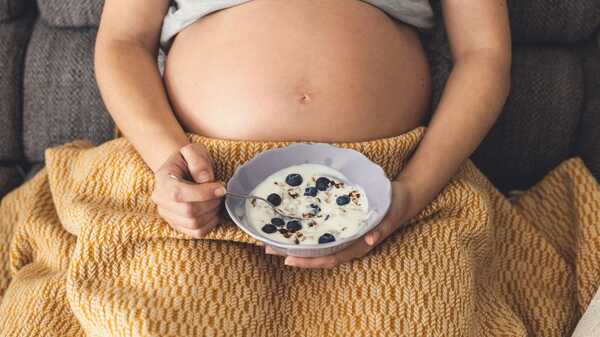
Michelle Baynham
19 Jul 2022
We all know the basics of what foods to avoid when it comes to being pregnant, no alcohol, raw fish, excessive amounts of coffee etc. However, there are many foods out there which can be harmful during pregnancy that so many are unaware of and the reasons why they should be avoided. Furthermore, when it comes to foods you should be eating plenty of, a common question can be “exactly how much should I be eating?”
Within this blog we explain what to eat and avoid during the next 9 months of your pregnancy journey. And the quantity of food you should be consuming.
Healthy and nutritious food to eat during pregnancy:
- Porridge/oatmeal
- Leafy greens
- Nuts
- Beans & Lentils
- Avocados
- Yoghurt
- Lean meats
All the above contain a variety of different nutrients that are proven to help a healthy pregnancy. Nutrients such as iron, calcium and protein should be part of a rounded eating plan full of nutrient-dense whole foods, giving you and your baby everything you’ll need over the next 9 months.
Quick Tips: Pregnancy Diet
- Dairy Foods - Greek/protein yoghurt are great for helping you meet an increased level of protein and calcium which is needed throughout pregnancy
- Sweet Potatoes - An excellent source of complex carbohydrate to boost energy levels and provides your body with vitamin A. Vitamin A is vitally important when it comes to the growth of your baby and the production of cells
- Salmon - Full of essential fatty acids which are vital for your babies brain and eye development
- Whole Eggs - Super nutritious full of protein and healthy fats. Eggs also contain a nutrient known as choline which is essential for overall health of the brain.
- Broccoli, Spinach, Leafy Greens - Rich in fibre and goodness. The majority of green veggies contain most of the nutrients your body needs.
- Chicken/Turkey - Packed with protein ensuring the growth of your baby’s vital organs.
- Berries - Full of antioxidants, vitamin c and fibre
- Whole grains, nuts and seeds - Rich in vitamin b which is known to help with the risk of pregnancy defects
- WATER!! - Finally and most importantly is staying hydrated! As you need to drink more water while pregnant, it’s recommended that you consume around 8-12 glasses of water a day. Being hydrated during pregnancy has so many benefits for pregnancy symptoms such as:
- Reduces swelling
- Decreases constipation
- Increases energy levels
- Lowers the risk of urinary tract infections and risk of preterm labour and preterm birth
Foods to avoid during pregnancy
The main 2 overriding factors when it comes to foods that should be avoided are, 1 - Any foods product that may contain any form of bacteria, 2 - Food products containing toxins and contaminants. There is also a selection of foods that should be consumed rarely, while some that should be totally removed from your diet when carrying a child. Here are some of the food types and drinks to completely avoid/minimise.
- Fish with levels of high mercury
- Undercooked, raw, and processed meat
- Raw/uncooked eggs
- Organ meat
- Caffein (sorry coffee lovers)
- Unpasteurised milk, cheese, and fruit juice
- Processed junk food
-
Alcohol
How much should you eat while pregnant?
For the first six months of your pregnancy (1st and 2nd trimester) you won’t need to have more calories than you did before you became pregnant. However, during the last three months of your pregnancy (3rd trimester) you will need an extra 200 calories a day. Keep in mind everyone is different, and some of us are more active than others. Conclusion During months of pregnancy, it’s crucial to completely avoid any food/drink source that may cause any sort of harm to your babies health, even the food that can be eaten in moderate doses, I would just avoid them completely.
The large majority of foods are safe, but it’s still so important to be cautious with your diet over the next 9 months.
A healthy diet plan also helps put the wheels in motion in introducing nutrient dense foods when your baby starts to develop eating habits.
The large majority of foods are safe, but it’s still so important to be cautious with your diet over the next 9 months.
A healthy diet plan also helps put the wheels in motion in introducing nutrient dense foods when your baby starts to develop eating habits.

Michelle Baynham
Share this article

